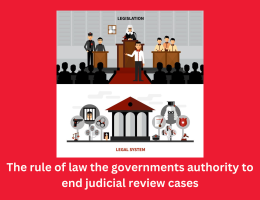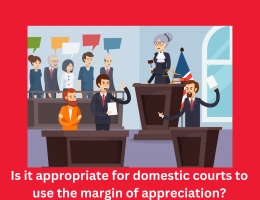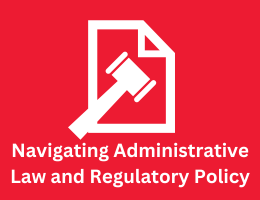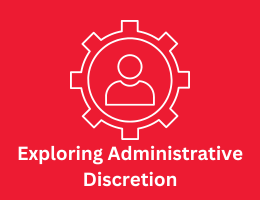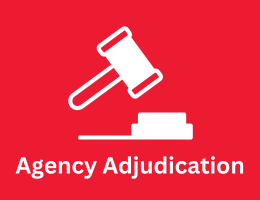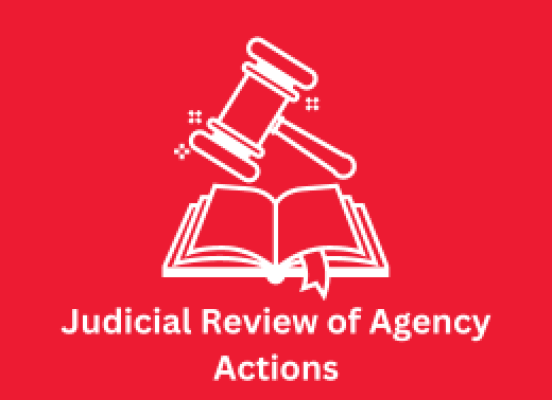
Judicial Review of Agency Actions: Ensuring Accountability and Legality
- By admin --
- Thursday, 07 Mar, 2024
Judicial review is an important tool for promoting responsible requirements for business governance and the processes of the law. It empowers judges to scrutinize the practices of administrative units and our organizations to ensure they adhere to constitutional standards and proceed within the limits of their regulatory authority. This article explores the complex area of judicial review of corporate activities, including the findings of the review. These requirements include the need for strong evidence, an unwanted reputation, and the respect of the firm.
Introduction to Judicial Analysis
Judicial review is an integral part of the American criminal justice system that reflects the concept of checks and balances by allowing courts to keep an eye on executive and legislative actions. Judicial evaluation in administrative regulation refers back to the process of reading agency acts to check their legality, constitutionality, and compliance with procedural necessities. It guarantees that administrative businesses run in compliance with the regulation and acts as a take a look at towards governmental abuse of energy.
Standards of Review
The standards that courts use to assess the moves of administrative organizations are vital to the judicial review method. These recommendations provide a number of tiers of scrutiny—from deferential to greater rigorous—for assessing the legality and cause of enterprise decisions. The tremendous evidence test, the arbitrary and capricious criterion, and deference to corporation interpretations are the three fundamental categories of scrutiny that courts regularly rent.
Arbitrary and Capricious Standard
Under the arbitrary and capricious take a look at, that is a respectful approach to judicial evaluate, organisation acts are upheld by courts until they're decided to be illegal, arbitrary, or an abuse of discretion. By adopting this preferred, courts supply administrative agencies large discretion and revel in, letting them make choices with amazing discretion.
Courts compare whether or not an organization took into account all pertinent data, gave a intent for its desire, and operated inside the bounds of its legislative power while determining whether or not an action is arbitrary and capricious. This general recognizes that administrative groups are often in a better position than courts to make complicated policy decisions due to their experience and specialised knowledge.
Substantial Evidence Standard
When administrative corporations make genuine findings, the extensive proof standard is applicable. According to this criterion, company authentic determinations which might be subsidized up with the aid of a vast body of proof within the administrative report could be given more weight with the aid of courts. A mild diploma of factual support is represented by way of great proof, that is defined as extra than an insignificant scintilla but less than a majority of the evidence.
Courts will now not rethink the facts or replace the organization's decision-making with their personal. Rather, if enterprise conclusions are bolstered with the aid of an inexpensive reading of the statistics, they'll be upheld. The giant evidence popular recognizes administrative organizations' proficiency in assessing complex and technical subjects and displays a respectful mindset to authentic findings.
Deference to Agency Interpretations
Apart from yielding to organization reality-finding, courts regularly accept company interpretations of their own regulations and laws. Courts need to yield to affordable enterprise interpretations of uncertain statutes or guidelines, a practice called Chevron deference or Auer deference.
Courts will follow enterprise interpretations of rules beneath the Chevron deference principle if the agency's analyzing is cheap and Congress hasn't expressly addressed the unique topic at hand. Courts will also comply with the precept of Auer deference, which states that they need to be given agency interpretations in their own regulations except they're manifestly wrong or contradict the law.
Conclusion
In administrative governance, judicial evaluation of employer acts is crucial to maintaining accountability, legality, and procedural compliance. Courts set up a balance among the requirement for judicial scrutiny and deference to administrative information by using enforcing standards of evaluate including the great proof check, the arbitrary and capricious preferred, and deference to corporation interpretations. Courts support the rule of thumb of regulation and defend the rights of people impacted through enterprise choices thru judicial evaluation, which complements the legitimacy and integrity of the administrative technique.

